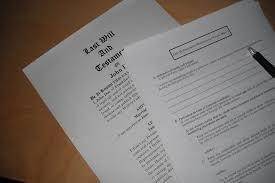Dear Savvy Senior,
What happens to a person’s possessions if they die without a will? I’m almost 60 years old and have never gotten around to making one, but the coronavirus crisis has made it a priority.
Will-less Willie
Dear Willie,
The coronavirus crisis has lit a fire under many Americans when it comes to getting their affairs in order. Currently, fewer than half of American adults have prepared a will or living trust.
If you die without a will, the state you reside in will determine what happens to your assets. Every state has intestacy laws in place that parcel out property and assets to a deceased person’s closest living relatives when there’s no will or trust in place. But these laws vary from state-to-state.
Here is a general breakdown of what can happen to a person’s assets, depending on whom they leave behind.
Married with children: When a married person with children dies without a will, all property, investments and financial accounts that are “jointly owned” automatically goes to the surviving co-owner without going through probate, which is the legal process that distributes a deceased person’s assets.
But for all other separately owned property or individual financial accounts, the laws of most states award one-third to one-half to the surviving spouse, while the rest goes to the children.
Married with no children or grandchildren: Some states award the entire estate to the surviving spouse, or everything up to a certain amount (for example the first $100,000). But many other states award only one-third to one-half of the decedent’s separately owned assets to the surviving spouse, with the remainder generally going to the deceased person’s parents, or if the parents are dead, to brothers and sisters.
Jointly owned property, investments, financial accounts, or community property automatically goes to the surviving co-owner.
Single with children: All state laws provide that the entire estate goes to the children, in equal shares. If an adult child of the decedent has died, then that child’s children (the decedent’s grandchildren) split their parent’s share.
Single with no children or grandchildren: In this situation, most state laws favor the deceased person’s parents. If both parents are deceased, many states divide the property among the brothers and sisters, or if they are not living, their children (your nieces and nephews). If there are none of them, it goes to the next of kin, and if there is no living family, the state takes it.
Make a Will
To ensure your assets go to those you want to receive them, you need to create a will or trust. If you have a simple estate and an uncomplicated family situation, there are do-it-yourself resources that can help you create all these documents for very little money.
Some top-rated options include the Quicken WillMaker & Trust 2020 downloadable software (available at nolo.com) that costs $90 and works with Windows and Macs and is valid in every state except Louisiana; LegalZoom (legalzoom.com), which offers basic wills for $89 or $99 if you’d like assistance from an independent attorney; and Trust & Will (trustandwill.com) which charges $89 for a basic will.
If, however, you want or need assistance or if you have a complicated financial situation, blended family or have considerable assets, you should hire an attorney. An experienced attorney can make sure you cover all your bases, which can help avoid family confusion and squabbles after you’re gone.
Costs will vary depending on where you live, but you can expect to pay anywhere between $200 and $1,000 for a will.
The National Academy of Elder Law Attorneys (naela.org) and the American College of Trust and Estate Counsel (actec.org) websites are good resources that have directories to help you find someone in your area.
Send your senior questions to: Savvy Senior, P.O. Box 5443, Norman, OK 73070, or visit SavvySenior.org. Jim Miller is a contributor to the NBC Today show and author of “The Savvy Senior” book.

